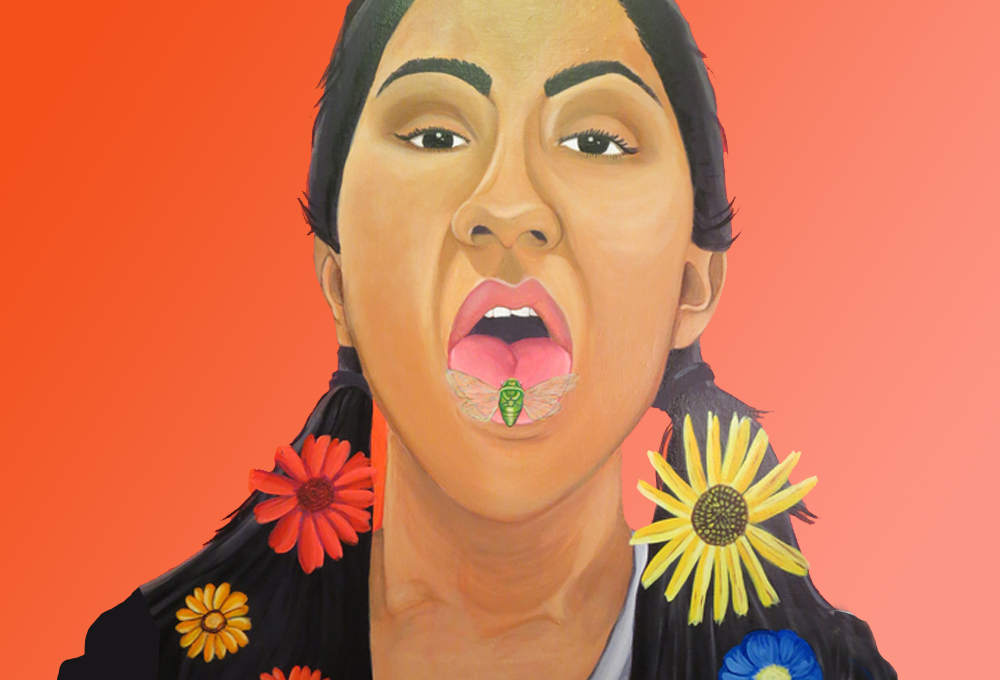Bards of the Borderlands

The Rio Grande Valley—made up of four counties located at the southernmost edge of the United States, where Texas becomes Mexico—has come into the news quite a bit since Donald Trump took office. When the president talks about building a wall along the southern border, he is talking about building it there.
Rio Grande writers, from Rolando Hinojosa-Smith to Domingo Martinez, may write about the border towns they hailed from, but they do so from Austin and Seattle. A reader of the Klail City Death Trip Series or The Boy Kings of Texas may so be forgiven for believing that the Valley has always been a place where literary talent, once realized, has to depart from.
The rise of two exciting Rio Grande Valley poets—Christopher Carmona and Amalia Ortiz—proves that this is no longer the case.
–
Christopher Carmona is a writer steeped in literary styles that run from the Beats to Bret Easton Ellis, and his work is fueled by music and film. The author of the short story collection The Road to Llorona Park (Stephen F. Austin State University Press) visualizes his fiction in “a cinematic way” before transmogrifying scene into text. This may be part of the fun for Carmona—a man who seems to see strictures amid freedom as not only a suitable theme for his characters, but perhaps a pursuable methodology for his craft.
Take for instance his book 140 Twitter Poems, a bilingual project that surfaces as the kind of minimalist haiku work reminiscent of Kerouac’s motel room poetry. The work came about because of a writing exercise:
I didn’t have time to set aside a lot of time to write, so I saw there was a Twitter poetry challenge for 30 days and thought I would give a try, but as a I tried it more and more, I extended it to 60 days and then when a friend of my started to translate them, I realized there was an interest in these poems. Then when I was going to stop, a friend of mine suggest I do 140 poems. I decided to do 140 poems and this book was born.

Poet Christopher Carmona
Carmona, who is an assistant professor at several universities in the Rio Grande Valley, is an unapologetic admirer of Beat writing. Typified by works like Kerouac’s The Dharma Bums and Burroughs’s The Soft Machine, the movement broke from the tropes of traditional narrative, yet harkened back to older forms of narrative song in a way that curiously carries strong parallels to much Mexican-American writing. He found himself hooked by their “fearless approach to telling their life stories, but also bending and breaking what we think of as narrative …Ultimately, the Beats gave me permission to write my stories in my own voice with the freedom to experiment with style and not follow the common themes of Chicano literature.”
Carmona always knew he was a writer and was always encouraged to read, and his boyhood appetite towards the eclectic maturated into a taste for rule-breaking books. He singles out Rios de Luz, who writes a blend of “Sci-fi, autobiography, and the human condition,” as well as Myriam Gurba, who he considers “the Chicana Mark Twain.”
Carmona does not believe there is a typical Latino writer, although he acknowledges the market encourages cliché:
There are those that stick to the immigration, grandmother’s hands, identity struggle themes of Latino literature that write in the same style as the writers of the 1960s to the 1980s. But there are writers that resist this, like Isaac Chavarría, Gabriel H. Sanchez, Rossy Lima.
Carmona sees “border writers” as often able to experiment in an enviable way that others, not standing between two worlds, cannot. His newest project is a series of young adult novels, El Rinche, retelling the story of the Lone Ranger as a light-skinned Mexican-American disguising himself as the ghost of a Texas Ranger.
When asked how the recent political climate has affected his work, Carmona says: “I’ve always written politically, it’s just now that people are paying attention.”
–
Poet Amalia Ortiz has performed on HBO’s Def Poetry Jam and spoken at TED Talks. She was raised by her grandparents, grew up in poverty. But, despite being broke, she always had books:
My grandparents owned a volume of encyclopedias and we were members of a children’s book of the month club for a few years when I was little. To think back on it, it says a lot about my grandparents’ values, because we were very poor. We didn’t even have a car, a clothes dryer, or air-conditioning growing up, but we had books.
Ortiz started writing to compete in San Antonio’s famed PuroSlam poetry competition. “Initially, I approached it as an opportunity to perform as an actor, and my first writing sounded more like monologues,” she says. But as soon Ortiz found her audience, she also found a responsibility to articulate personal tragedy into public action.

Poet Amalia Ortiz, from Paul Gregory Photography
“Shortly after I began participating in Slam, I was a victim of acquaintance rape,” she shares. “I immediately began writing about it, and formed an all female writing and performance troupe called ‘Women of Ill Repute: Refute!’” The group wrote and performed inside and out of Texas, raising money for the San Antonio Rape Crisis Center. “My politics and activism have been married to my writing and performances ever since,” she says. For Ortiz, writing is activism, and activism is all about making sure oppression does not go unchecked.
When a friend of hers created a video based on her poem “The Women of Juarez,” Ortiz found herself being threatened via user comments. One viewer commented: “You are beautiful. I want to rape and murder you.” “As a survivor of rape. I was [shaken] to my core. I filed a police report. The cop treated me like I was wasting his time. I made him file it anyway,” she says.
Her first manuscript of poetry, Rant. Chant. Chisme. (Wings Press) was accepted for publication at the end of her first year of graduate school, and she worked sections of her defense into her second book, Cancion Cannibal Cabaret (forthcoming from Wings Press)—as a kind of punk rock musical that “smacks my audiences in the face with righteous anger.”
Ortiz left the Valley for decades, but elected to return to the land with her husband. She found the return instructive and inspiring. “I was struck by the overwhelming social issues which torment the Valley—poverty, immigration, institutional racism,” she notes. “My poetry was already political, and my writing style was far from subtle.”
“I looked around me and saw a culture struggling with literacy,” she says. “I believe there is a place for subtle, complex writing in higher arts and letters, but I also believe … that there is a place for poetry which grabs and shakes people, because some people need to be grabbed and [shaken].”
When Donald Trump was elected president, suddenly politically charged, in-your-face poetry was in. “Since his presidency, political anthologies are being printed left and right,” she says, adding: “There wasn’t as much being written about the wall when I first moved back in 2012 … Now, so many Valley writers are standing in opposition against expanding the wall.”
Ortiz is happy to see Valley writers becoming more politically active, but she bemoans that so many waited for the worst before getting involved. “There has been a wall down there wreaking havoc on wildlife for years – not to mention demoralizing locals with its mere appearance. I honestly hope that new activism isn’t just a trend, but something that continues, as there will always be a need for it.”

Roberto Ontiveros is an artist, critic, and fiction writer. Some of his short stories have appeared in the Threepenny Review, the Santa Monica Review, and Huizache. Some of his book reviews have been published in the Dallas Morning News, the San Francisco Chronicle, and the New Jersey Star-Ledger.
Roberto Ontiveros
